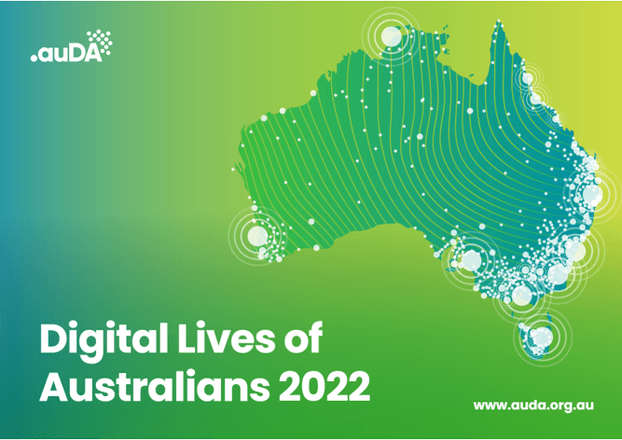Digital Lives of Australians 2022
The Digital Lives of Australians 2022 report is the second in an ongoing annual study by auDA, building on the inaugural 2021 research.

The Digital Lives of Australians 2022 report is the second in an ongoing annual study by auDA. The study provides an in-depth exploration into the online experiences of Australians to understand what they value, their most significant challenges and identify opportunities that will support improvements in online outcomes for Australians.
Key findings
- Post-pandemic, Australians continue to recognise the internet’s positive impact with 98 per cent saying it delivers value to their lives
- Younger Australians are more likely to say they couldn’t live without the internet yet of those aged 70 plus, only three per cent say they do not need the internet at all, demonstrating its utility across age groups
- Around one third of Australians in Victoria, New South Wales and Queensland consider the internet invaluable, compared to a quarter of those living in South Australia, Western Australia, Tasmania/Australian Capital Territory/Northern Territory
- 61 per cent of working Australians say they could not do their job without the internet
- 84 per cent of small businesses would struggle to operate without the internet
- The two main benefits of the internet for small businesses are customer engagement and flexible working arrangements
- Other benefits for small businesses include promoting, monitoring and streamlining business activities, however, less than a third of businesses report they are currently realising these benefits.
- Small business demand for key digital skills outweighs consumer interest in developing those skills. This digital skills gap may prevent small businesses from effectively harnessing online opportunities. The biggest gaps are in:
- Developing and maintaining a website
- Working with data visualisation
- Deploying Search Engine Optimisation (SEO)
- Younger Australians and those from culturally and linguistically diverse backgrounds report an interest in digital upskilling, helping address the digital skills shortfall. Career progression is amongst the leading motivators for those wanting to develop their digital skills
- Not all small business owners can afford to hire staff or contractors with the desired digital skills. Instead, they will look to develop skills themselves through training, including free resources and formal courses.
- Cyber security is a top concern for consumers and small businesses
- Four out of five consumers are concerned about their personal data being stolen and three quarters have concerns about their online privacy, with women more concerned than men
- Almost a third of small businesses consider online scams (31 per cent) and the security of their business data (29 per cent) to be a major concern
- Despite this concern, many consumers and small businesses are unsure as to how to protect themselves and show low awareness of available cyber security tools and resources
- Only six per cent of consumers and 12 per cent of small businesses used government resources to educate themselves on online security in the three months prior to the survey
- 17 per cent of consumers and 19 per cent of small businesses used search engines for cyber security help and advice in the three months prior to the survey. Only half of consumers change their passwords every few months. Small businesses are more vigilant, with 72 per cent changing their passwords every few months
- Less than 50 per cent of small businesses feel very confident with processes to protect their online security
- More than half of the small businesses surveyed spend less than $1,000 annually on cyber security, including 17 per cent which spend nothing at all. Only 13 per cent plan to increase their spending on cyber security in the coming year
- Three quarters (74 per cent) of consumers surveyed agreed that cyber criminals are becoming smarter and more sophisticated, so it is important to stay up-to-date with the latest online security trends, yet just over half (56 per cent) feel confident they have safeguards in place to keep their personal data secure online.
- Australians are mostly positive about the future of the internet. Younger Australians and those from culturally and linguistically diverse backgrounds are most excited by future online opportunities. However, some consumers feel overwhelmed when considering future internet technologies, in particular older Australians.
- Activities consumers are most interested in doing more of in the future include accessing news and information, government services, online banking and content streaming
- Consumers and small businesses are cautiously optimistic about emerging internet technologies but hold concerns about cyber security, data privacy, complexity and the impacts of automation.
- Awareness of emerging technologies is high but awareness has not yet translated into widespread adoption or intention to use them
- Consumers have mixed attitudes to emerging technologies. They are more positive about smart homes (42 per cent) and automated healthcare (38 per cent) but remain cautious about the metaverse (21 per cent) and blockchain (19 per cent) technologies
- Small businesses are more positive than consumers about emerging technologies, particularly smart building technology (51 per cent) and workplace automation (40 per cent). Around a third of businesses report they are likely to use each of workplace automation (32 per cent), smart buildings (37 per cent), the metaverse (30 per cent) or blockchain (28 per cent) in the future.
Download report
The research was conducted in partnership with SEC Newgate Research. It included a survey of over 1,500 consumers and nearly 400 small businesses, as well as an online discussion forum and in-depth interviews with selected participants.
Helpful resources
Australian Cyber Security Centre
Access best practice cyber security guides and alerts on cyber threats.
Visit cyber.gov.auOffice of the Australian Information Commissioner
Learn about privacy legislation, your privacy rights and access guides for businesses.
Visit oaic.gov.auOther research reports
Explore other research conducted by auDA.